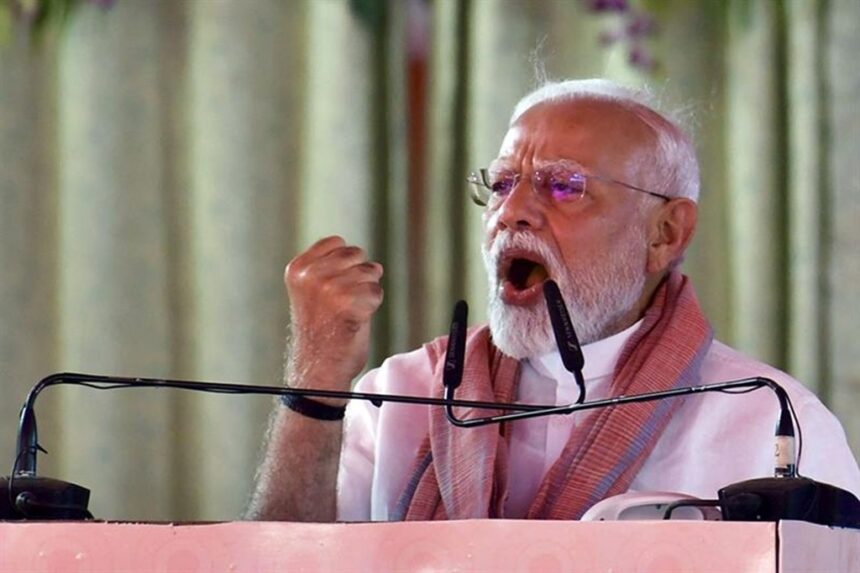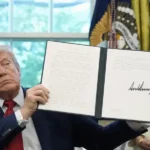India and Pakistan have exchanged a series of diplomatic actions following a deadly attack in Indian-administered Kashmir that left 26 people dead. India’s Prime Minister Narendra Modi said his government would pursue “to the ends of the earth” the people responsible for the attack.
On Thursday, Pakistan expelled India’s Defence, Naval, and Air Advisors from its embassy in Islamabad, declaring them unwelcome and ordering their immediate departure. Visas for Indian nationals are now cancelled, except for Sikh pilgrims.
Pakistan also closed its borders, halted trade, and blocked its airspace to Indian airlines, according to a statement from Prime Minister Shehbaz Sharif’s office following a national security meeting.
Earlier, India responded by suspending a water-sharing agreement, closing the main land border with Pakistan, downgrading diplomatic relations, and revoking visas for Pakistani citizens, except for diplomats.
India’s move came after gunmen killed 26 men in Kashmir, an attack which Indian authorities blame on Pakistan-backed groups. India also ordered all Pakistani nationals to leave, except for those working in embassies and consulates.
Tensions between India and Pakistan
Indian Prime Minister Narendra Modi vowed to track down everyone involved in the attack. Indian police said two of the suspected gunmen were Pakistani nationals. Pakistan has denied any involvement in the incident.
Tensions between India and Pakistan are at their highest in years, with many analysts expecting that India might take further action, possibly military. Some suggest a response could come soon, although others believe India may first review its options.
The attack, which targeted civilians and the tourist trade in Kashmir, marks a shift in violence in the region. Previously, such attacks focused mainly on security forces. Direct attacks on the tourism industry, a key part of Kashmir’s local economy, are rare.
Ajai Sahni from the Institute for Conflict Management in New Delhi noted that attacks on tourists break an unspoken rule, as many in Kashmir rely on tourism for their livelihood.
In 2024, Indian officials said 3.5 million tourists visited Kashmir, mostly from within India. Authorities presented this as a sign that the region was returning to normal after a major government crackdown in 2019, when India revoked Kashmir’s special status and imposed direct rule.
Analyst Praveen Donthi said linking tourism numbers to stability in the region may have motivated militants to shift their targets.
Michael Kugelman, a US-based commentator, said the scale and nature of the latest attack make an Indian military response more likely, though he expects India to carefully consider its next steps.
India’s past responses have varied. In 2019, after an attack on security forces in Pulwama killed 40, Indian jets bombed targets in Pakistan twelve days later, during an election campaign. So far, India’s recent actions have been mostly diplomatic and symbolic.
The suspended Indus Water Treaty affects water sharing, but India has limited ability to restrict water flows to Pakistan. The closure of the Attari-Wagah border crossing, a symbolic site known for its daily military ceremony, is also significant, though few people cross there.
Ajai Sahni warned against military action, saying earlier strikes had achieved little and that India has other, less visible options if it chooses to respond. Relations between India and Pakistan remain tense, with both sides taking steps that could lead to further escalation.
Pakistan Government Denies Involvement
On Thursday, Pakistan once again rejected claims that it played a role in the Pahalgam attack, which occurred in Jammu and Kashmir, a popular tourist spot under Indian control. Officials in Islamabad pushed back against India’s charges, accusing Prime Minister Modi’s government of backing terrorism instead.
Pakistan’s National Security Committee criticised India’s decision to halt the 1960 Indus Waters Treaty, which governs how the two countries share the Indus River system.
In a statement released after a meeting, the committee warned, “Any move to block or redirect water that belongs to Pakistan under the Indus Waters Treaty will be seen as an act of war. We will respond with all the power at our disposal.”
The committee also announced that Pakistan would stop honouring all agreements with India, including the 1972 peace treaty, until India stops what it called the support of terrorism inside Pakistan and cross-border violence. This statement appeared to reference allegations that Indian agents were involved in targeted killings of Sikh activists in Canada and Pakistan.
The committee went further, saying it would suspend the Simla Agreement, which has helped shape relations since the end of the 1971 conflict. The deal set the “Line of Control” between the two sides in Kashmir.
Police in Jammu and Kashmir reported on Thursday that two of the three suspects in the Pahalgam massacre were Pakistani citizens. They identified the men as members of a militant group behind one of the deadliest civilian attacks in India.
An online “Wanted” notice labelled the suspects as members of Lashkar-e-Tayyaba (LeT), a group based in Pakistan and known for the 2008 Mumbai attacks that killed 175 people.
Terrorism will not break India’s resolve
On Thursday, while speaking in Bihar, Prime Minister Modi vowed to track down and punish those behind the latest attack. He said the government would go “to the ends of the earth” to bring the killers to justice, just as it did after the 2019 suicide bombing in Kashmir that killed 40 security personnel.
Modi declared, “India will find, track, and punish every terrorist and their supporters. Terrorism will not break India’s resolve. What happened in Pahalgam will not go unanswered.”
In response, India shut down its only border crossing with Pakistan, expelled Pakistani military advisers from its diplomatic missions, withdrew its advisers from Pakistan, and reduced the total number of diplomats in each country from 55 to 30.
India’s decision to pause cooperation on the Indus Waters Treaty marks a first. This move could severely hurt Pakistani agriculture, especially with the country facing a tough economic period and the start of the planting season.
Pakistan’s foreign minister, Ishaq Dar, said in a local TV interview on Wednesday that Islamabad had no part in the Pahalgam attack. He insisted there was “no evidence” linking Pakistan to the violence. Dar also warned that Pakistan would retaliate if India took action against it.
“There will be a tit-for-tat response, nothing less,” Dar said during his appearance on Dunya News.
The diplomatic standoff puts Pakistan’s shaky economic recovery at risk. Two years of high inflation and rising energy costs have already strained families and the business sector.
Pakistan depends on the Indus Waters Treaty to secure access to the three western rivers, which are key for irrigation, power, and daily use.
Related News:
US Deepens Ties With India to Counter China’s Growing Influence

Geoff Thomas is an award winning journalist known for his sharp insights and no-nonsense reporting style. Over the years he has worked for Reuters and the Canadian Press covering everything from political scandals to human interest stories. He brings a clear and direct approach to his work.












